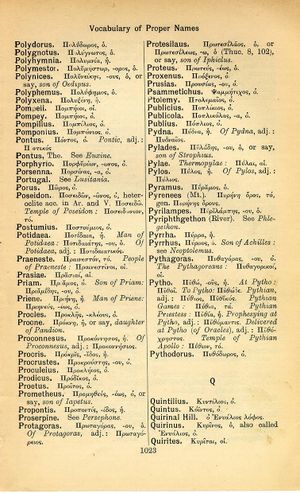Polyhymnia: Difference between revisions
From LSJ
οὐ μακαριεῖς τὸν γέροντα, καθ' ὅσον γηράσκων τελευτᾷ, ἀλλ' εἰ τοῖς ἀγαθοῖς συμπεπλήρωται· ἕνεκα γὰρ χρόνου πάντες ἐσμὲν ἄωροι → do not count happy the old man who dies in old age, unless he is full of goods; in fact we are all unripe in regards to time
(D_7) |
(Gf-D_7) |
||
| Line 1: | Line 1: | ||
{{WoodhouseENELnames | {{WoodhouseENELnames | ||
|Text=[[File:woodhouse_1023.jpg|thumb|link= | |Text=[[File:woodhouse_1023.jpg|thumb | ||
|link={{filepath:woodhouse_1023.jpg}}]]Πολυμνία, ἡ. | |||
}} | }} | ||
{{Lewis | {{Lewis | ||
Revision as of 07:44, 14 August 2017
English > Greek (Woodhouse)
Πολυμνία, ἡ.
Latin > English (Lewis & Short)
Pŏlyhymnĭa: (Pŏlymnĭa, Poët. ap. Anth. Lat. 1, p. 51 Burm.), ae, f., = Πολυμνία (she of many hymns),
I one of the Muses, Hor. C. 1, 1, 33; Ov. F. 5, 9; Mart. 4, 31, 7; Aus. Idyll. 20.
Latin > French (Gaffiot 2016)
Pŏlўhymnĭa, æ, f. (Πολύμνια), Polymnie [muse des rythmes multiples] : Hor. O. 1, 1, 33 ; Ov. F. 5, 9.

